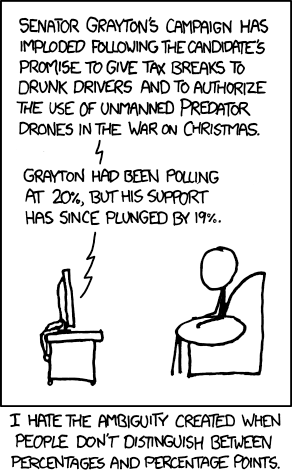Why lying with maths is so easy, the average person, even in developed countries is practically innumerate (massive hyperbole, but the fact lying with numbers is easy, still stands)
In the same vein, if the volume on your phone is on 1, and you increase it to 2, it has increased by 100%
Kinda. Logarithms are weird
i think
Wrong: I had a 1% chance, and I doubled my chances. Now my chances are 101%.
Right: I had a 1% chance, and I doubled my chances. Now my chances are 2%.
Wrighongt: I had a 1% chance, and I doubled my chances. Now my chances are 3%, because I’m a lucky person.
Sleep deprived fraction lover: I had a 1% chance, and I doubled my chances. Now due to 1/100 * 1/100 I chances are 0.0001%.
Funny thing is this is a language issue, not a math issue.
Why not both?
I’ve always thought of math as a language and I talk to my kids about it that way too. Math is an other way to describe the world.
It’s very different from spoken languages and translating between the two needs to be learned and practiced.
Our math education doesn’t include enough word problems and it should be bi-directional. In addition to teaching students how to write equations based of sentences we should teach them how to describe what’s going on in an equation.
Yeah, it is kinda both in general. Though in this case, the math about this is well-defined: it’s possible to increase a percentage either with addition or multiplication and both of those can make sense, just the words we would use to describe them are the same so it ends up ambiguous when you try going from math to English or vice versa.
But the fact that switching between communication language and a formal language/system like math isn’t clear cut does throw a bit of a wrench in the “math doesn’t lie”. It’s pretty well-established that statistics can be made to imply many different things, even contradictory things, depending on how they are measured and communicated.
This can apply to science more generally, too, because the scientific process depends on hypotheses expressed in communication language, experiments that rely on interpretation of the hypothesis, and conclusions that add another layer of interpretation on the whole thing. Science doesn’t lie but humans can make mistakes when trying to do science. And it’s also pretty well established that science media can often claim things that even the scientists it’s trying to report on will disagree strongly with.
Though I will clarify that the “both” part is just on the translation. Formal systems like math are intended to be explicit about what they say. If you prove something in math, it’s as true as anything else is in that system, assuming you didn’t make a mistake in the proof.
Though even in a formal system, not everything that is true is provable, and it is still possible to express paradoxes (though I’d be surprised if it was possible to prove a paradox… And it would break the system if you could).
Yes. I really think that the translation part is one of the hardest.
As a brief aside, I want to note that this conversation is happening in one of the languages we’re discussing and that could influence any conclusion we come to. I’m also going to suggest that we ignore Gödel for now
There are many people who are good at math. There are even a lot of people who are reasonably good at grinding through the mechanics of math. That doesn’t solve any of the problems you described above.
Statistics are a great example of this. Early statistics classics are mostly about the mechanics; here’s how you calculate the mean, standard deviation, confidence intervals, etc. 2 types of students generally come out of that class; math students who will forget all of that because they’re going to learn the “real” versions (eg they go through a huge number of proofs that involve calculus and linear algebra), and students who will forget all of that because the whole thing sounds like gibberish.
We teach natural languages the same way but we go much farther. Students learn vocabulary and grammar rules but they’re also expected to learn how to use them correctly. We had students current events articles and ask them to analyze them. We ask students to practice many writing methods including fiction and expository writing.
When I talk to my own kids about statistics I never write any formulas. I ask questions like, “What do you think ‘mean’ means?”, “If I have a bunch of <example item> does ‘mean’ describe it well?”, “What happens if I add an <example item> with <huge outlier>? Do you still think it’s a good description?” “How would you describe it better?”
If I ever had to design an introductory statistics course it would contain very little “math”. Classes, homework, projects, and tests would consist of questions like; “Here’s some data and an interpretation, are they lying? Why or why not?” “Here’s a (simple) data scenario. Tell me what’s going on.” “Here’s some (simple) data. Produce a correct and faithful summary. Now produce a correct but misleading summary. Describe what you did and the effect.” “Here’s a conclusion. Provide sample data that most likely fits the conclusion.” “Change one word in the sentence, ‘Increase your chances by 80% means that there is now an 80% chance.’ to make it a true statement.”
I know all this. I play DPS!
Even more confusing when you hear that the odds of catching a disease have increased by a %. In many ways odds can be more intuitive, but we’re so used to working with simple probability that it’s a total nightmare to wrap your head around at first.
Did this turn into an /iamverysmart thread ?
I’ve always wondered how to disambiguate multiplication and addition of percentages. I guess that’s what percentage points are for?
The annoying part is that there is no well-known notation for showing percentage points, so people use % for both percentages and percentage points.
I like how some games use “increases by +10%” as percentage points and “increases by 10%” as percentage.
Or how oath of exile does it, with “(base + base * increases by y%) * z% more”
So with a base of 5%, chance increased by 20%, and chance increased by 30%, with a 40% more chance, you’d get:
(5% + 5% x (20% + 30%)) x (1+40%) = 7.5% x 1.4 = 10.5%
In deep rock galactic survival, the color of the number is different for percentage and percentage points
We really should just have a different symbol tho. Maybe we do, I’m not a math wiz, but we certainly don’t have a broadly used one.
Exactly. Unfortunately, they aren’t used widely and consistently enough. Even in the press. So you frequently have to second guess what you’re reading.
10% of your people vote for a party.
The votes increase by 10% => now 11%
The votes increase by 200% => now 30%
The votes increased by 50 percent points => now 60%
Convert percentage to fraction, i.e, 80% become 0.8 Then multiply with initial value
If it says 80% more use initial + (initial80) or simply initial1.8
Or if it says 80% less, use - in above calculation or multiply by 0.2
I find percentages more neat when used as fractional number
I said that to a friend of mine how to get percentage by creating fraction. They were flabbergasted at the sorcery.
The friend is a Doctrate of biological sciences and a professor. Where as I am just an engineer.
Convert percentage to fraction, i.e, 80% become 0.8
That’s not a fraction.
⅘ is a fraction.
You know we say “a fraction of something” with a number(usually between 1 and zero) often denoted by letter epsilon. 4/5 equals 0.8 so there is nothing wrong in calling that a fraction too
Edit: Its called Decimal Fractions
This is just annoying pedantry you know what they meant.
It’s really not even converting, as percent is literally “1/100” (per-cent = per 100). It’s purely convenient shorthand.
Yeah, the math straight up works in the fractional form
Can’t believe nobody has linked the relevant xkcd yet

Which of course is why people referred to points when discussing stocks/markets. Got to love an unambiguous term.
🫡
We appreciate your service.
🫡
It’s really pretty simple - if something increases by 80%, you add 80% of whatever it already is… one dollar becomes $1.80… one percent becomes 1.8 percent.
Most people don’t understand it because they’ve seen it done wrong so often, the wrong way seems right.
I’m quite willing to bet that 70% of the population has no clue that percentages, fractions, and decimals are the same thing.
Then odds show up to the party and upend everything we thought we understood.
That’s about 60% more than expected
You mean 38 percent points higher ?
I think you can increase that by about 7.5/10%
Is that 7.5 percent or 7.5 percentage points though? :/
I think it’s ambiguous and the 90% actually makes more sense. If you increase something by 5m you are taking the original value and adding 5m to it. For multiplication you should probably avoid the word increase and say scaled by instead. 10% scaled by 180% is 18%.
The different ways in which numbers slide up, down, sideways, diagonally.
Is the example in the post part of the fifth type of arithmetic?
- Addition +
- Subtraction -
- Multiplication x
- Division /
- Modulo %
The first time I learned about modulo as its’ own branch of arithmetic was long out of school already, I had only hazily heard of it, on a PBS Nova documentary in the 1990s about Fermat’s famous theorem and when it was proven after centuries of failed tries.
No it’s not modulo, it’s how to talk about increasing a number by a percentage of the number.
Yeah we just learned “by” was a standard term for multiplication. So increased by 80% was just 1.8 times whatever you started with. “Divide by” meaning multiply inversely
Language translating to artithmetic. I’m sure it doesn’t always line up, as we change language quite often.
Dark Souls cleared this up for me real quick.
well it’s ambiguous. Its also a sloppy way of expressing an increase by 80 percentage points.
That’s not sloppy, that’s simply wrong
Fair enough, I’m inclined to agree. It’s a relatively common error though, still leaving it ambiguous outside of circles where you expect people to express themselves with mathematical precision.









